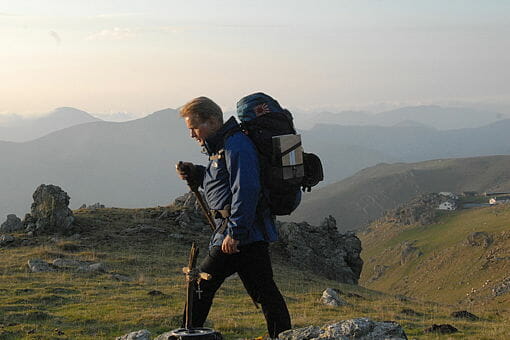By Pam Glazier · October 10, 2011

The Way is a movie about Tom (Martin Sheen), a man who completes the pilgrimage that his son Daniel (Emilio Estevez) died attempting. Now of course Tom is jaded and cold; and of course Daniel was grateful for life and relished each passing moment. Along the way, as is to be expected, Tom finds himself.
This idea of personal journey to enlightenment is made quite clear in the trailer of this film, and was one of the main reasons that I wanted to see it. There’s nothing like seeing a suffering and flawed character butterfly into something more—the best of all of us. We can all relate to such a grand moment of catharsis. This is why I was so disappointed when I finally saw this film. It could have been so much more.
The story for this film had some great moments that were subdued and quietly moving. However, it also had a lot of clunky and forced moments of Disney sap; and somewhat decently made montages that, despite their flawless execution, tromped all over any real moments of connection that the characters involved could have had—not to mention the fact that these montages were set to songs by James Taylor and Alanis Morisette (still shuddering).
So let’s identify some of the problems. First, are the various characters that Tom meets along the way. They’re extremely two-dimensional. There’s the annoying yet congenial fat-guy (Yorick van Wageningen), the bitter divorcée (Deborah Kara Unger), and the prone to theatrics writer with writer’s block (James Nesbitt). These are fine starting places as far as character development goes, but the movie runs as if the character development happened on the fly while the movie was being written. That is to say that the fat guy was nothing but annoying and congenial when we first meet him. It’s even how he introduces himself. And when Tom first meets the divorcée, she picks a fight with him for no reason based on assumptions that she would have no reason for having. It’s weird and distracting. Then there is the writer, whose first appearance in the film runs like a comedic Shakespearean soliloquy—hyperbolic mannerisms and all. It was a good delivery and interestingly written, but this scene would do better on a stage where it wouldn’t distract from the overall story and tone of the already established movie.
Another point of contention is how the audience learns of Tom’s decision to finish the pilgrimage in honor of his son. Since Tom starts out on his own, there’s no one else there to deliver exposition. So he sits there and explains his deeply personal reasons for the trek. This directly counters who Tom is. He is angry and private, but he’s spilling his guts because somebody’s got to explain to the slow people in the back what the hell is going on—and apparently (at least to the makers of this film) overly-obvious exposition is preferable to subtly crafted visual cues.
And yet another stupid aspect of the movie is the idea that the audience is going to care about why the other people are on the pilgrimage. The fat guy wants to lose weight, the divorcée wants to quit smoking, and the writer wants to write again. Sure, they have to have a reason for being there in the first place, but there’s just too much time and significance spent on this stuff when all of it pales compared to Tom’s reason.
And don’t even get me started on the forced dialog, forced moments of comedy, forced moments of meaning—there were so many moments that were forced and clunky that they overshadowed the better parts of the film.
All of these horrors could have been avoided if they simply sent the final draft to whatever go-to script-doctor happens to be currently in vogue. One last pass where the entire film is ripped apart and sewn back together again by a master of the craft would have made this thing a possible Oscar contender. The makings of a good movie are in it, but it’s riddled with sophomoric errors. I mean, come on! These are basic first-year screenwriting axioms: cut all the montages; show it, don’t tell it; characters are like icebergs, all you see is the tip but they run deep. Hell, based on all these foul-ups, I’m surprised they managed to avoid using voiceovers.
And maybe I’m just too young or whatever. Maybe James Taylor and Alanis Morissette are moving and contain added unknown significance for the baby boomer generation, but I just thought they were annoyingly distracting. An original score would have done much better for this movie.
But even though all those problems riddled this film, a good story still peeked its head out from time to time. I even think a person could enjoy this movie as long as they went into it expecting it to be bad. But if you really like this kind of film and relish the telling of a cathartic personal journey, do yourself a favor and skip this one. Rent Ridley Scott’s A Good Year or Audrey Wells’ Under the Tuscan Sun. (You can thank me later).